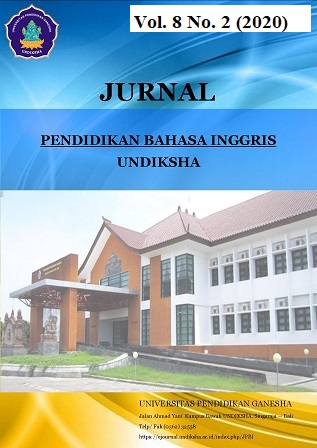MORAL VALUE AND CHARACTERS BUILDING EXPOSED IN FOLKLORE OF TONGKAT TUNGGAL PANALUAN
DOI:
https://doi.org/10.23887/jpbi.v8i2.30969Abstract
Folklore is a traditional story and plays an important role in teaching character of children because it is full of moral values. Folklore become a guide lines and also become a role model to behave well because in folklore there is an implied meaning containing advices and moral messages. The purpose of this study is to find out the moral values of folklore Tongkat Tunggal Panaluan and the importance of those values to build good character of children. This study is qualitative research design and data was collected from reading the folktale text repeatedly and then analyzed the data with content analysis. The instruments of this research are interview and documentation. The result of this study showed that there are four dominant values contain in folklore Tongkat Tunggal Panaluan include religious value, honesty value, responsibility value and social value that divided into two, helping each other and caring each other. From the research, the researchers found that folklore of Tongkat Tunggal Panaluan had many moral massage which could teach children’s character
References
A.R. Saidek and R. Islami.(2016). Character Issues: Reality Character Problems and Solutions through Education in Indonesia: Journal of Education and Practice.
F. Junaidi.(2018). The internalization of character education values for students in islamic boarding school: International Journal of Science and Research.
Firdauzia.(2017). Local Wisdom Values In Sayu Wiwit Folklore As The Revitalization Of Behavior Education : Jurnal Of Social and Islamic Culture.
Herawan,dkk.(2017). Relevansi Nilai Pendidikan Karakter Dalam Geguritan Suddhamala Untuk Meningkatkan Mutu Pendidikan Di Indonesia: Jurnal Penjaminan Mutu.
Kusmiyati, A. (2014). An Analysis of Moral Values in Ahmad Fuadi's Novel Ranta 1 Muara. Un Published Thesis: Wijaya Putra University.
Nuryantinigsih, W. D. (2017). Animasi Kartun Bertema Falsafah Jawa sebagai Pendidikan Karakter Bagi Anak Usia Dini: Rekam.
Susanti, D. A. (2020). An Analysis of Moral Values Taken from Edensor Novel by Andrea Hirata. Un Published Thesis: STAIN Salatiga.
N. Novianti,(2017). Teaching character education to college students using buildings roman: International journal of instruction.
Khairani,Leylia.(2017). Revitalization of Value and Meaning Toba Batak Folklore in the Formation of Character Education of Children: Atlantis Press.
Youpika, F. & Zuchdi, D. (2016). Nilai pendidikan karakter cerita rakyat suku pasemah bengkulu dan relevansinya sebagai materi pembelajaran sastra: Jurnal Pendidikan Karakter.
Indiarti, W. (2017). Nilai-nilai pembentuk karakter dalam cerita rakyat asal-usul watu dodol: Jentera.
Haryati, S. (2018). Pendidikan Karakter dalam Kurikulum 2013. FKIP UTM.
M. Chowdhury . (2018). Emphasizing morals , alues, ethisch, and character education in science education and science teaching: MOJES Malaysia online journal of educational sciences.
Wiguna, M.Z. & Alimin, A.A. (2018). Analisis Nilai-Nilai Moral dalam Cerita Rakyat
Kalimantan Barat: Jurnal Pendidikan Bahasa IKIP PGRI Pontianak.
F. Junaidi.(2017). The values of character education values in andai-andai folklore and its use as learning material in elementary school: International e-journal of advances in education.
P. Anggraini and T. Kusniarti.(2016). The Implementation of Character Education Model Based on Empowerment Theatre for Primary School Students,: Journal of Education and Practice.
Downloads
Issue
Section
License
Authors who publish with the Jurnal Pendidikan Bahasa Inggris Undiksha agree to the following terms:- Authors retain copyright and grant the journal the right of first publication with the work simultaneously licensed under a Creative Commons Attribution License (CC BY-SA 4.0) that allows others to share the work with an acknowledgment of the work's authorship and initial publication in this journal
- Authors are able to enter into separate, additional contractual arrangements for the non-exclusive distribution of the journal's published version of the work (e.g., post it to an institutional repository or publish it in a book), with an acknowledgment of its initial publication in this journal.
- Authors are permitted and encouraged to post their work online (e.g., in institutional repositories or on their website) prior to and during the submission process, as it can lead to productive exchanges, as well as earlier and greater citation of published work. (See The Effect of Open Access)













